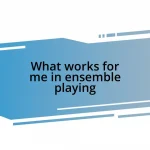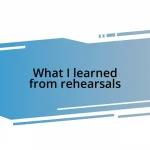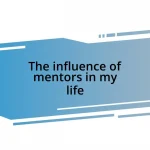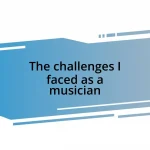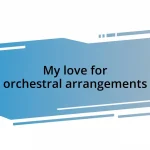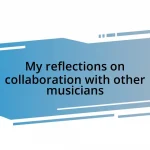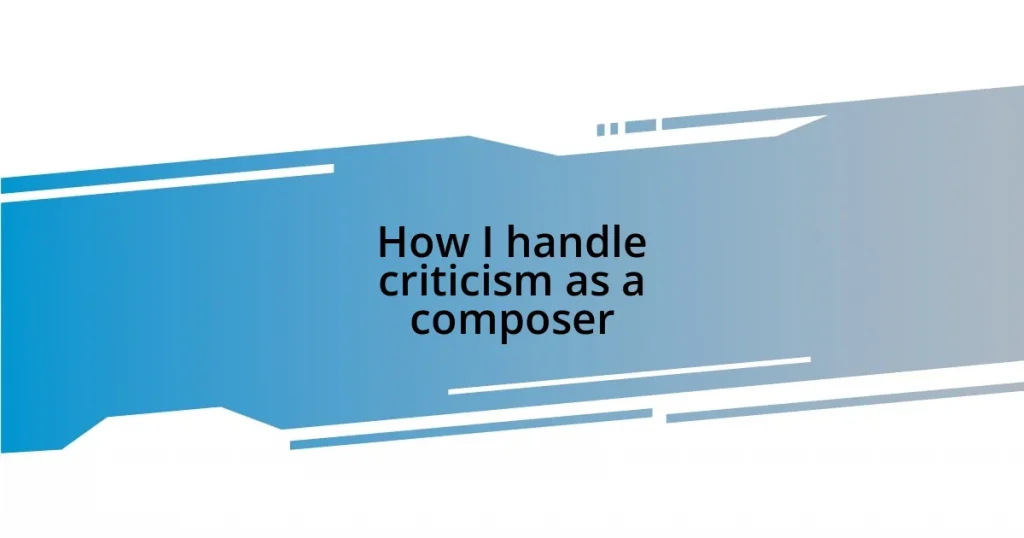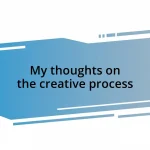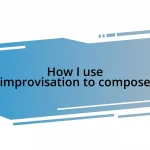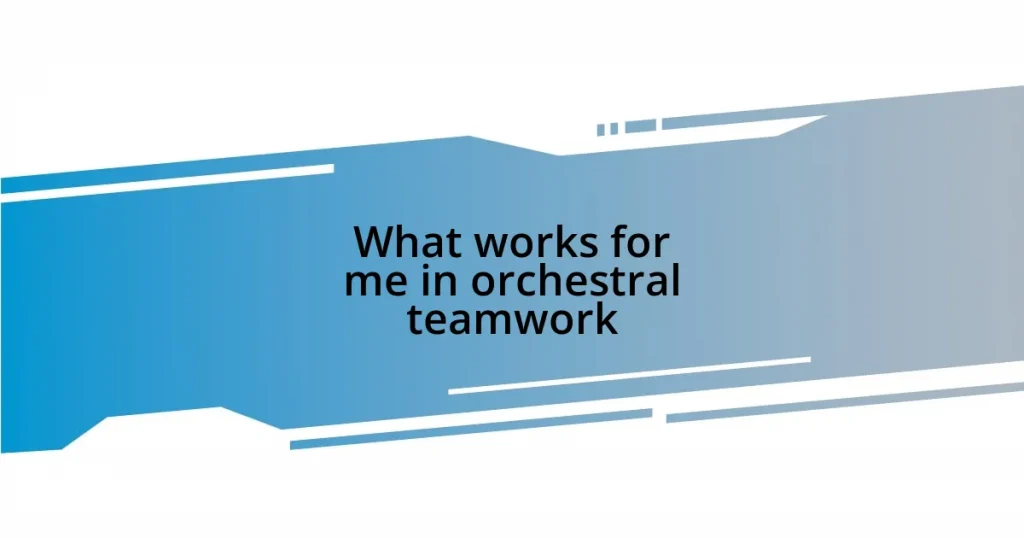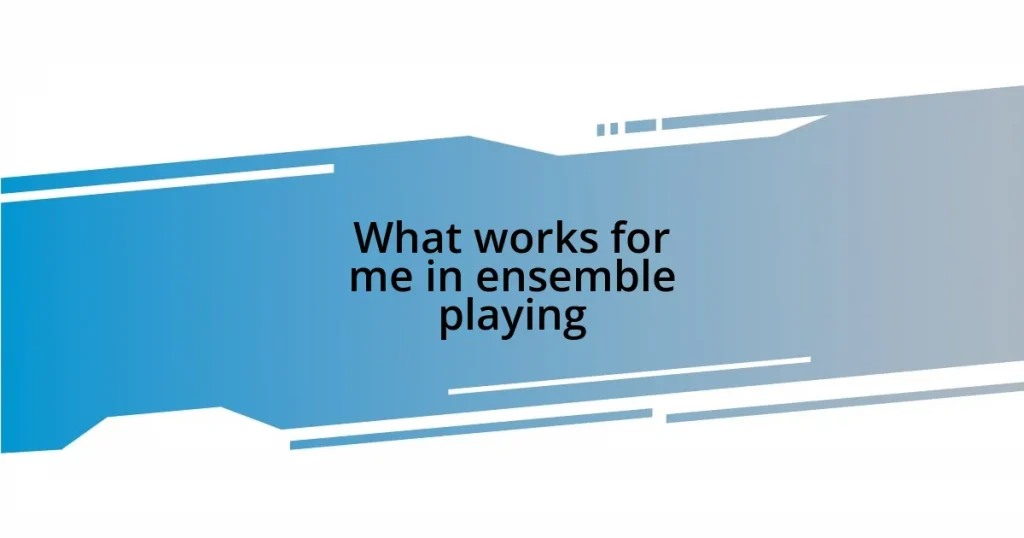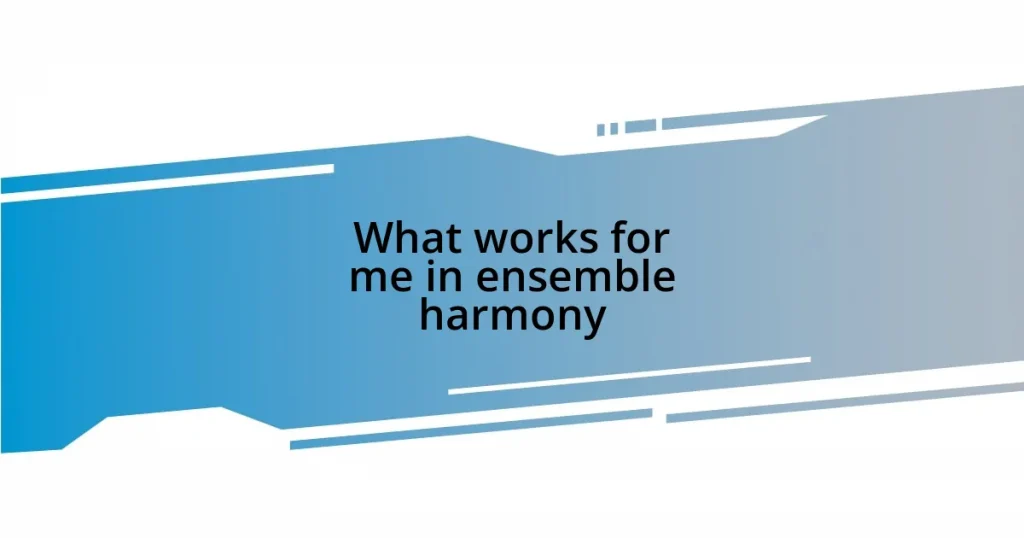Key takeaways:
- Criticism is an opportunity for growth; reframing it as constructive rather than personal helps refine creativity.
- Recognizing and processing personal emotions toward criticism can transform negative feelings into constructive insights.
- Applying feedback actively and in small increments fosters collaboration and enhances overall compositions.
- Developing strategies, such as journaling and role-playing responses, prepares composers to engage with criticism positively and productively.
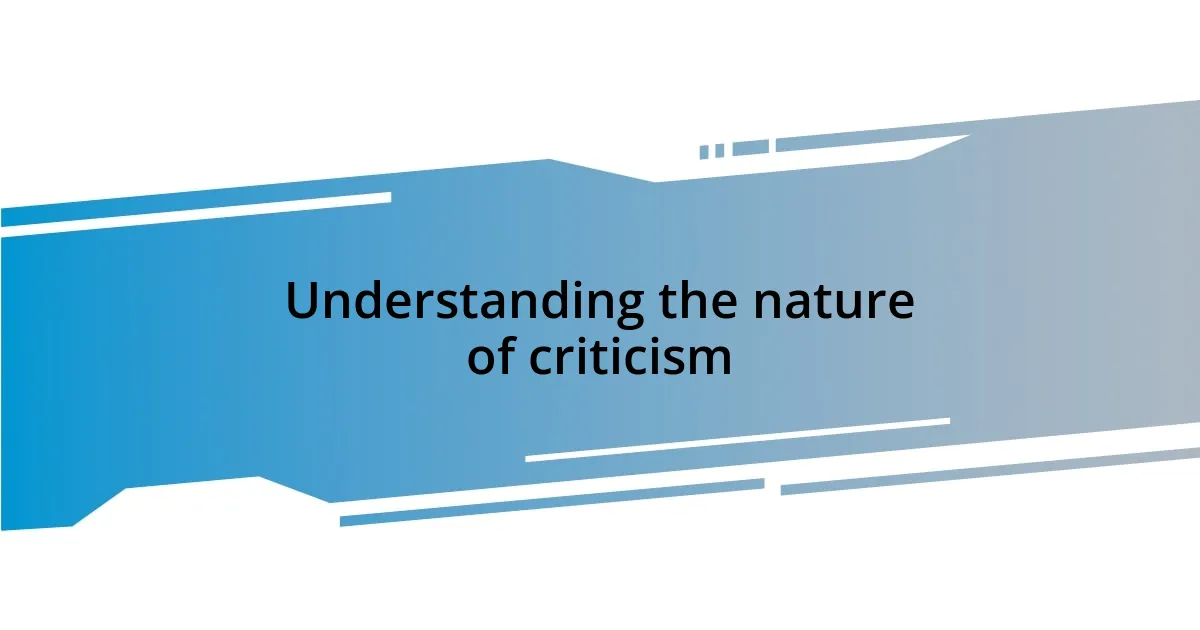
Understanding the nature of criticism
Criticism, at its core, is an opportunity for growth. When I first started composing, I remember receiving feedback that felt harsh. Initially, it stung a bit, and I thought, “Why are they attacking my passion?” However, with time, I learned to see criticism as an invitation to reflect and revise, rather than a personal affront.
The nature of criticism often depends on the perspective from which it comes. I recall a mentor sharing their thoughts on my work during a workshop. Their insights were framed with care and experience, making me realize that their intentions were not to diminish my creativity but to help me refine my craft. It got me thinking—how often do we confuse constructive feedback with negativity?
Understanding that criticism is subjective can be freeing. I’ve faced a range of opinions on my compositions, from enthusiastic praise to less favorable notes. What strikes me is how each listener brings their own experiences and biases into their judgments. When I began embracing this notion, I asked myself, “What can I learn from this viewpoint?” This shift in mindset allowed me to appreciate the diversity of reactions, enriching my approach to music composition.
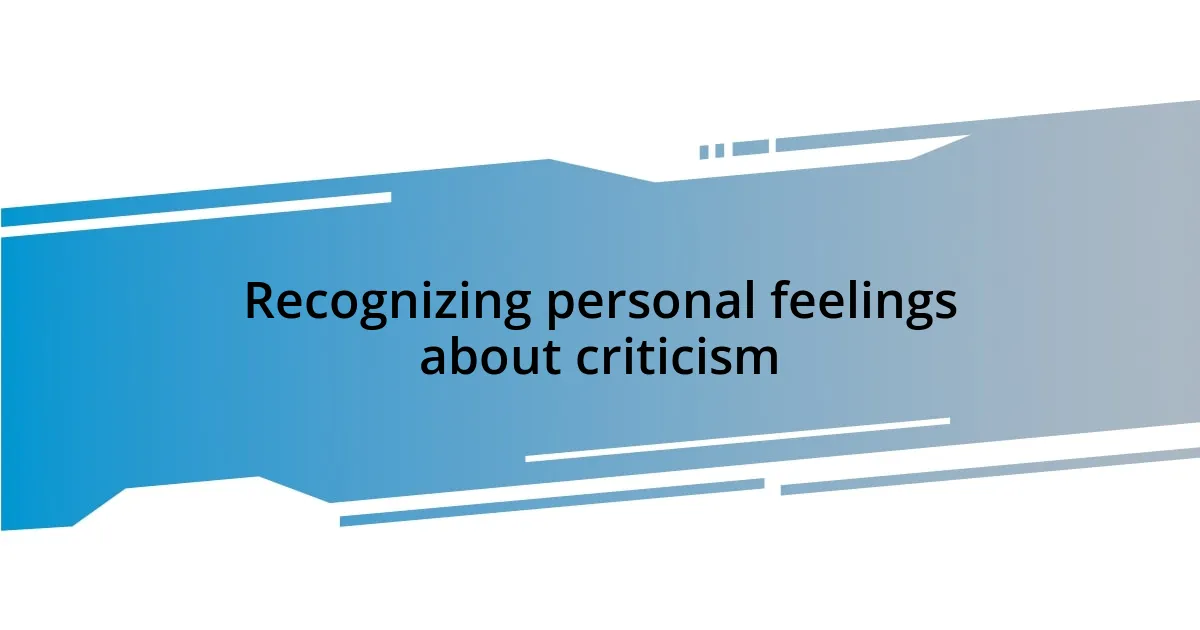
Recognizing personal feelings about criticism
Recognizing personal feelings about criticism is an essential step in my journey as a composer. I often wrestled with my emotional responses when receiving feedback. There were times I would leave a review session feeling deflated, replaying comments in my mind as if they were on a loop. It took me a while to realize that these feelings were valid but could also cloud my judgment if I let them take control.
Here’s what I learned about acknowledging those emotions:
- Initial Discomfort: I’ve felt a rush of frustration or sadness, especially when I held a piece close to my heart.
- Reflection Time: I found that taking a step back and allowing myself to process those feelings helped me approach feedback more objectively.
- Growth Mindset: Embracing vulnerability became my ally; recognizing that discomfort can lead to significant growth transformed my relationship with criticism.
By overcoming these emotional hurdles, I’ve been able to turn criticism into a productive force rather than a stumbling block on my creative path.
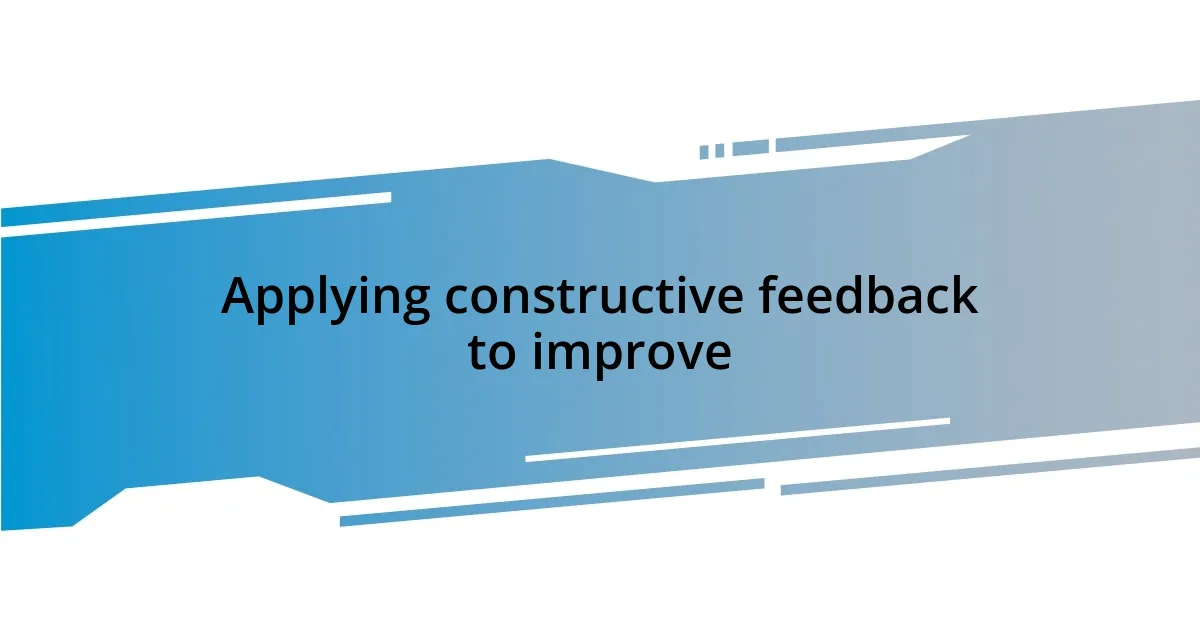
Applying constructive feedback to improve
Applying constructive feedback to improve involves an active and thoughtful approach. When I receive feedback, I try to focus on the specific points raised rather than getting lost in my initial emotional reaction. I remember a time when a colleague suggested altering the structure of a piece I had poured my heart into. At first, I felt defensive, but taking a moment to reflect, I realized their suggestion opened up fresh possibilities. By experimentation with their ideas, I often find I can enhance my original vision.
The key here is to analyze the feedback critically. I often write down the comments, categorizing them into actionable items. For instance, I once faced critique about my melody being too repetitive. Instead of dismissing this, I dissected the suggestion and considered how varying the rhythm could breathe new life into the piece. This approach not only helped my work but also fostered a sense of collaboration between me and my colleagues, as they could see their input reflected in my progress.
Lastly, I strive to compress feedback into bite-sized changes that I can digest over time. Feedback doesn’t have to be overwhelming! Once, after a particularly intense critiques session, I focused on just one suggestion a week. This strategy helps me stay motivated while enabling me to incorporate improvements without feeling swamped. I find that small steps often lead to the most significant breakthroughs in my compositions.
| Aspect | My Approach |
|---|---|
| Feedback Reception | Focus on specific points over emotional response |
| Action Plan | Write down comments and categorize them |
| Implementation | Incorporate feedback in small, manageable steps |
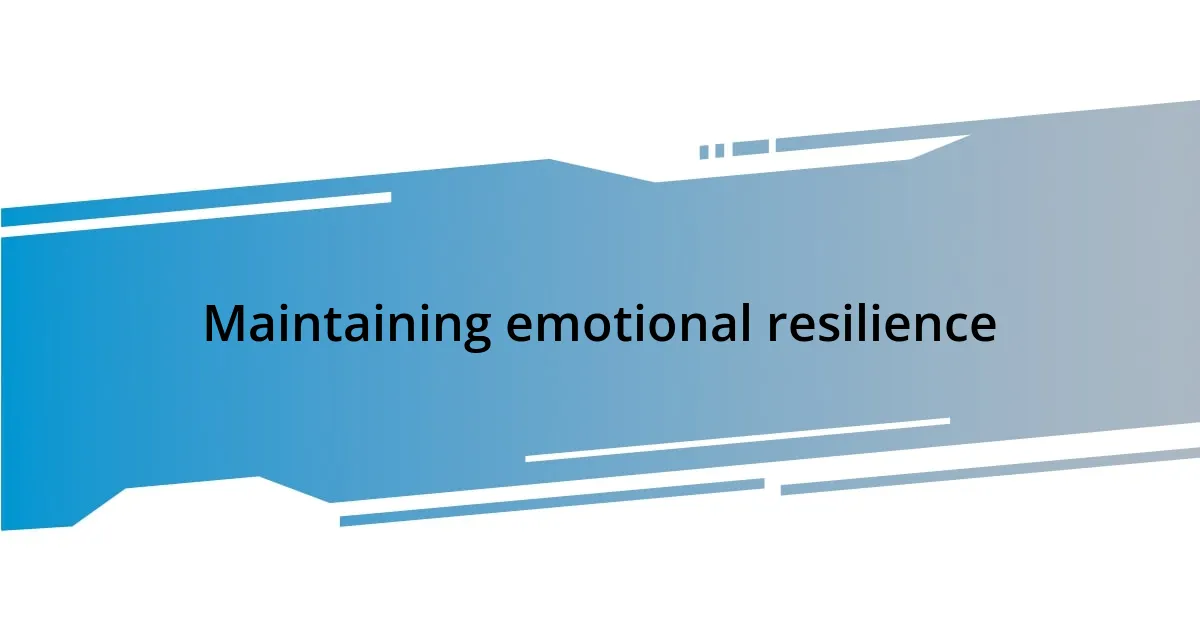
Maintaining emotional resilience
Maintaining emotional resilience, for me, often means developing a toolkit of strategies to manage the inevitable tumult of criticism. One realization that struck me was during a particularly tough feedback session, where I felt like my entire creative world was under siege. I took a deep breath, closed my eyes, and reminded myself that this was just one perspective. How could I restructure my thoughts to transform that wave of frustration into something constructive? This mindset shift began to fortify my resilience, helping me to treat critiques not as personal attacks, but as opportunities for enhancement.
Additionally, I find value in surrounding myself with a supportive community of fellow composers. There have been moments when I felt utterly defeated, contemplating giving up on a piece. During those times, a simple chat with a trusted friend who understands the creative process has been the lifeline I desperately needed. They remind me that my worth isn’t tied to the opinions of others and that each composer faces their share of setbacks. It’s a vital lesson: understanding that vulnerability and resilience coexist beautifully can reshape how I perceive criticism.
Finally, I’ve learned to celebrate small victories along the way. After a challenging critique session, I often reward myself with something enjoyable—like treating myself to a favorite album or taking a walk in nature. These little celebrations serve as reminders that growth takes time. I ask myself, “What have I learned today?” and in doing so, I cultivate a sense of progress. Reflecting on my journey—every bump and obstacle—fuels my emotional resilience, turning each experience into a stepping stone for greater creativity.
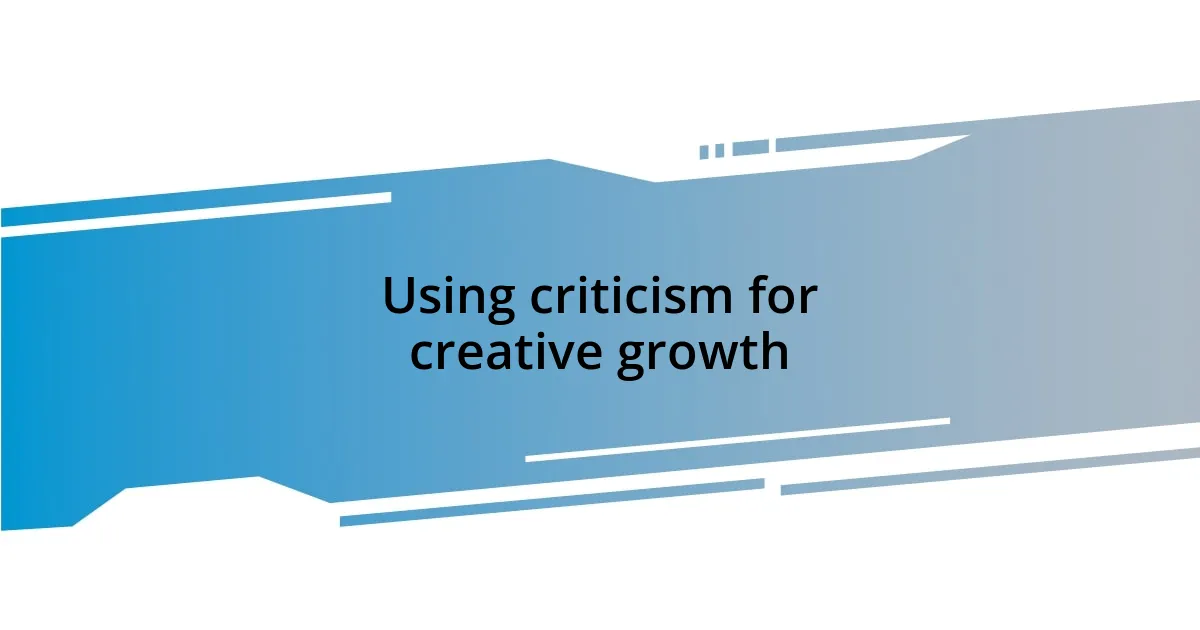
Using criticism for creative growth
Using criticism for creative growth has genuinely transformed my approach as a composer. For instance, I once received feedback on a piece I thought was nearly perfect. A mentor pointed out that my transitions felt jarring, which initially stung. But rather than dismissing it, I sat down and revisited those sections with fresh ears. It was eye-opening! Embracing that feedback allowed me to create smoother connections between themes, which ultimately elevated the entire composition.
There’s also a powerful lesson I learned through a less-than-ideal performance of a new piece. After the performance, I absorbed various critiques, and one particular comment left me unsettled—it was about the emotional impact of my work. Instead of spiraling into insecurity, I took it as a challenge. I asked myself, “How can I infuse more emotion into my melodies?” This reflection spurred me to incorporate richer harmonies and dynamic contrasts in my pieces. The result was astounding and deeply fulfilling; not only did I enhance my work, but I also reignited my passion for composing.
I often wonder how many composers shy away from constructive criticism out of fear. In my experience, that hesitation can be a creative dead end. Opening up to feedback has allowed me to explore new techniques and perspectives. There was a time when I hesitated to share my work, fearing negative responses, but I’ve learned that shared experiences lead to growth. This exchange of ideas has sparked collaborations that I never would have pursued otherwise. Emphasizing the importance of constructive feedback, I truly believe it is one of the cornerstones of creative evolution.
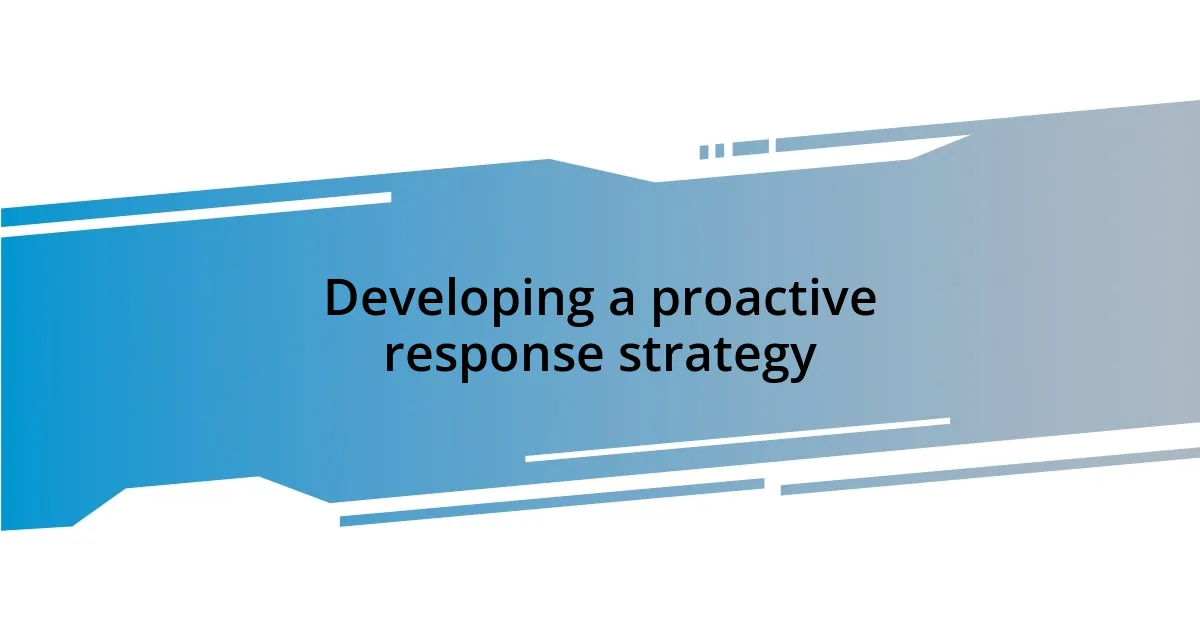
Developing a proactive response strategy
Developing a proactive response strategy in the face of criticism has been a game changer for me. I remember a particularly harsh review that left me feeling like I was standing on unstable ground. Instead of letting it flatten my spirit, I decided to create a specific plan: I kept a journal where I not only recorded the critiques but also my emotional responses to them. By doing so, I learned to identify patterns in my feelings and responses. What surprised me was how often a negative reaction accompanied constructive feedback. This journal became a safe space, helping to transform my initial hurt into actionable insights.
Another strategy I’ve embraced is role-playing how I might respond in real-time to tough feedback. When I encounter jarring criticism, it’s easy to feel defensive. So, I practice responses—both in my head and aloud—with fellow composers. I’ll ask them to throw me their hardest critiques, and I take deep breaths while responding calmly. How powerful it feels to shift from a reactive state to one of thoughtful engagement! This practice has not only equipped me with the tools to handle criticism but has also fostered a sense of camaraderie and understanding with my peers.
Finally, I recognize that preparing for criticism means understanding its potential impacts on my creative process. I often reflect on occasions when I allowed negativity to cloud my judgment. After producing a piece that was received disappointingly, I spent a week wallowing in self-doubt. But then I realized that the energy I spent dwelling on it could instead fuel my next creation. Now, I actively remind myself that each critique is a stepping stone rather than a stumbling block. It’s about framing every experience, good or bad, as a necessary part of my growth as an artist. How else can I evolve if I don’t embrace the full spectrum of feedback?


